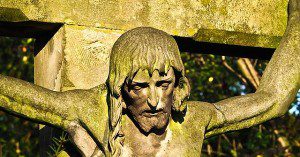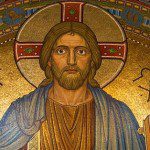In the early mornings this week, as I’ve struggled (Christian word for fail) to get my whole mind into the daylight, I’ve run into several articles about James MacDonald and Harvest Chapel—this one is long and detailed. I don’t quite understand all the ins and outs and implications, except that a lot of money is being talked about, more than I can personally fathom right this moment.
And all the while the refrain from Sunday’s passion reading, “Let him save himself,” and, “save yourself,” is still ringing in my tired ear. The crowd is astonished that the one who manifested so much power—who healed and fed multitudes, who cleared the temple and held it as his own in the face of armed temple guards, who even raised the dead—should stay there, bleeding, on the cross, when everyone knows he can come down.
The instinct for self-preservation is so strong that most of us don’t really need to be worried about ‘self-care.’ When you see a car coming, you instinctually step back from the curb. When the stove is hot, you draw back your hand. When someone offends you, you click the ‘mute’ button. When you bash your toe on the kitchen stool, you slump against the cabinet with a cry, nursing your injury and your pride. That’s why the bravery of people who go straight into dangerous and terrible situations for the safety of others draws such a deeply emotional response of surprise and gratitude. That’s why I got an epidural whenever I managed to get there on time. Because saying no to the safety of your own body and soul, even for the sake of someone you love, goes against what lies at the core of the human person.
And why the crowd passed by and shook their heads, unable to comprehend what stood before their very eyes. Because no buildings were on fire, no train was barreling down the track toward a foolish pedestrian, no clear danger presented itself. And, being blind, no one in the crowd had eyes to see the malign threat that marks out and ruins the human creature—every creature in every corner of the world.
And that is that our deeply ingrained instinct for self-preservation is the thing that ultimately leads us to eternal death. We circle into ourselves to protect and feed and clothe ourselves instead of grabbing on to the one who would not save himself. We save ourselves in every way we can, because it seems like the right and obvious thing to do. There is no other option. We say it all the time, ‘Do what you’ve gotta do’ and the rest of the line, often unspoken, ‘to be ok.’
There is nothing less ok than bleeding and dying on a hard splintered block of wood, naked and humiliated, for all the world to see. In the world of social media sharing, that’s an image that won’t make it past our community standards. It is horrifying. Terrible. Bizarre.
‘He saved others,’ the crowd muttered, but he wouldn’t save himself. Why? It doesn’t make any sense.
Except that he, who had all that power, also had a great and inexplicable love. And so, because you could not save yourself, not in the full and total sense that you need saving—past the end of today when you limp home and manage to get dinner on the table, or soothe your shattered feelings with comfortable sweats and a big bowl of ramen, past the quiet scroll through instagram, past the retreat into yourself away from a terrible and impossible conversation that you are sure won’t fix anything, past the glass or piece of whatever it is that you like best—he did not save himself.
He stuck there, alienated and rejected, so that you could come back into the fellowship of human comfort, of divine forgiveness, of being truly fed and healed and cared for in the way you need so much.
This is not about money, or motorcycles, or fame, or being right. This is about the weak human soul who perishes on his own, who stumbles in the dark by her own power. This is about a God who doesn’t cling and grasp onto anything for his own glory, but lets all of it go for the saving of others.
And yet it is for glory. What a glory, that at a moment of such terrible humiliation, the greatest salvation of human history should be accomplished. He saved others for himself, gathering them in like lost sheep, catching hold of them from the clutches of ruin and trouble. He is the Good Shepherd, the kind King, the one who laid down his life for his friends.
Anyone who says anything different isn’t worth following, no matter what else they might be promising to give away. They are saving themselves, and that is no salvation at all.













